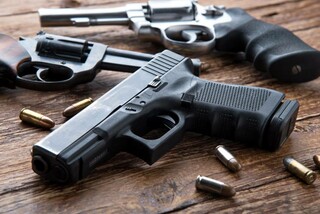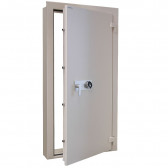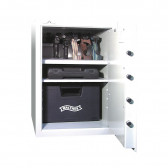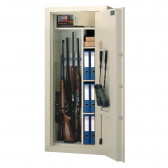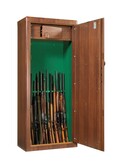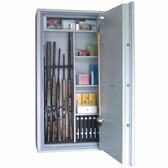Owning a gun safe is not a fad, but a requirement of legislation that has been in force for years. Before making a purchase, it is advisable to analyse various issues and broaden your knowledge. A mistake made at the outset can cost a lot. So can inadequate storage of weapons.
In line with the law
You have probably seen many film scenes in which the protagonist pulls a gun out of a drawer, a wardrobe with clothes or from under a bed. You have probably also come across scenes in which, for example, a gun that is in an easily accessible place ends up in the wrong hands. Tragedy can happen easily. So forget about storing weapons in any way. Relevant guidelines on the subject must be sought in the Law of 21 May 1999 on arms and ammunition and the General Regulation to the Law on arms of the Minister of the Interior on the storage, carrying and registration of arms and ammunition of 26. August 2014. In practice, you should set your sights on owning a device that meets the requirements of at least class S1 according to the PN-EN-14450 standard. Whether you are a hunter, sport shooter or collector.
Optimum choice
Finding a product that meets the standards mentioned above should not be a problem, but the choice should always take into account the individual needs of the buyer. There are many offers on the market prepared for storing various types of weapons. Safes for short weapons are usually small in size (approx. 30 cm high, 45 cm wide and 40 cm deep). They resemble safeguards found, for example, in hotel rooms. However, there is no shortage of models in which long firearms can be stably placed in an upright position (the height is usually 160 cm or more). In this case, several holders are usually available. In addition, ammunition safes are also available, but usually their size is much smaller than those for long firearms (e.g. a height of about 100 cm). Ammunition safes will be particularly useful for shooting enthusiasts, as the specific nature of this sport involves firing a large number of shots during a single training session.
More on the topic of proper selection of a weapon cabinet can be found in the article "What class should a gun safe have? Regulations vs. reality".
The door to the kingdom
If you want to display your weapons, an exclusive safe with armoured glass will meet your requirements, at the same time providing adequate security for your weapons. However, the market is dominated by models in which the casing does not have transparent elements and the door is usually opened from the right side. Their opening angle is 90, and sometimes even 180 degrees. Weapon safes with a door opening angle of 90 degrees have, in comparison with those which offer 180 degrees, limited functionality connected with the difficult access to the inside of the safe from the door side – they reduce the light of the door, but if you do not have too much space or you place the safe by the wall, they can be an optimal solution.
Selected models are also equipped with lockers-shelves and holders for cut-outs placed on the internal door shield. Sometimes the back wall is divided. For example – on the left side there are 7 gun holders and on the right side there are 4 removable and height-adjustable shelves. This allows a different use of the smaller part. Instead of placing weapons in it, shelves can be placed, and on them, for example, files with documents.
Time for inspection
Whether you store your weapons and ammunition correctly can be checked. The competent police authorities are entitled to do this, and in the case of professional soldiers, the competent military authorities. Identifying the places of control is not a problem. The Chief Constable of the Police keeps a register of persons holding a firearms licence, as well as those authorised to possess firearms, those applying for a firearms licence or authorisation to possess a firearm, and those holding a firearms registration card. This list includes, inter alia, the address of residence. If a person changes his place of residence, he is obliged to inform the competent police authority of this within 14 days of the change. During an inspection, the safe owner may be asked to open the safe in order to check whether the inside of the door bears a label issued by a recognised European certification institute, confirming a minimum of class S1 in accordance with EN 14450. However, it must be remembered that class S1 only fulfils the minimum legal requirement, but does not constitute solid burglary protection and does not protect against fire at all.
Care or punishment
Violation of the rules on the storage and registration of weapons and ammunition and their carrying may also have unpleasant consequences. The police have the right to refuse to issue a weapon permit or to withdraw it from a person who has acted contrary to the regulations in force. The above-mentioned Act clearly indicates that weapons and ammunition should be stored and carried in a manner that prevents unauthorised access to them. Special care must be taken when transporting firearms. They cannot be left in the car unattended, unsecured. It is possible to install a suitable gun safe in the car. If you frequently travel with weapons, check whether the place you are going to can rent a safe where you can legally deposit them.
This may be interesting for you: Why must you always keep your weapons in a safe?
